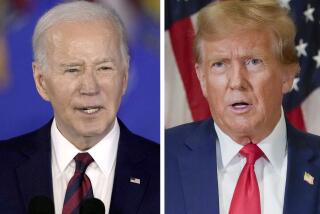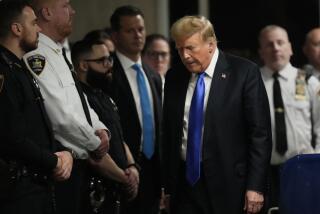Fund-Raiser’s Lawyers Ask Judge to Reverse Conviction
- Share via
WASHINGTON — Attorneys for a former Democratic fund-raiser who was convicted last March in a campaign finance scheme challenged the government’s case against her Thursday and asked a judge to reverse her conviction.
Lawyers told U.S. District Judge Paul L. Friedman that the defendant, Los Angeles immigration consultant Maria Hsia, who raised funds for Vice President Al Gore, was unfairly convicted of causing false reports to be filed with the Federal Election Commission.
Citing a legal technicality, they argued that reports containing accurate names and addresses of donors cannot be considered false, even if the names do not represent the true sources of campaign funds.
Friedman took their arguments and the government’s rebuttal under advisement, saying that he would hand down a written ruling in the near future.
Nancy Luque, Hsia’s defense attorney, told Friedman that FEC donor reports filed by political committees “are not a statement of anything” under federal criminal law. The reports that figured in Hsia’s conviction never stated “that these people were the true sources of various contributions,” Luque declared.
To prove in a criminal trial that a statement is false, “you have to have an actual statement that says something on its face,” she argued. But a list of campaign donors “is not an actual statement,” Luque said.
Hsia’s conviction on five felony counts stemmed from her role in a 1996 fund-raising event at a Buddhist temple in Hacienda Heights that Gore attended. The luncheon at the Hsi Lai Temple netted more than $100,000 for the reelection campaign of President Clinton and Gore.
The funds were among about $3 million later returned by the Democratic National Committee. It suspected that the money represented donations from foreign sources, which are illegal in American political campaigns. In sworn statements, both Clinton and Gore have said they were unaware at the time that vast sums had originated from abroad.
At Hsia’s trial, former chief Democratic fund-raiser John Huang testified that she had given him a batch of donor checks worth $55,000 in a sealed envelope a day after the temple luncheon. Defense lawyers told jurors there was no evidence that Hsia knew the checks were from “straw parties,” and Huang could not dispute that.
At Thursday’s court hearing, Luque said reports filed by the Democrats, based on such checks, were not false reports because “they do not indicate the true identity of donors. They only say from whom they got the checks.”
“Did the [Democratic] treasurer have an obligation to provide the actual sources?” a skeptical Judge Friedman asked the defense lawyer.
Luque replied that jurors “could not have assumed such a duty” in the absence of any evidence at trial. “If the duty existed, and [the treasurers] did not perceive their duty or act on it, then they are at fault and Maria Hsia is not,” she said.
Justice Department prosecutor John McEnany strongly disagreed, saying that the FEC requires lists of “true contributors” because its enforcement staff often attempts to verify the legality of political contributions.
Urging Friedman to reject defense “theories,” McEnany said that jurors at Hsia’s trial arrived at a “reasonable” verdict. They concluded that, when Hsia handled “conduit checks,” he said, she knew they involved illegal foreign funds.
But Friedman, in a ruling two years ago, demonstrated some sympathy for Hsia’s position. He dismissed the core of the government’s case at that time, saying prosecutors had used “Alice in Wonderland” logic to claim Hsia was to blame for the false filings. However, an appellate court reinstated the charges and instructed Friedman to proceed to trial.
Hsia, 48, a naturalized U.S. citizen born in Taiwan, appeared at Thursday’s hearing but was not called upon to testify. If her conviction is allowed to stand, she could face a maximum term of 25 years in prison and more than $1 million in fines. However, prison sentences for convictions in FEC-related cases have been rare.
More to Read
Sign up for Essential California
The most important California stories and recommendations in your inbox every morning.
You may occasionally receive promotional content from the Los Angeles Times.










